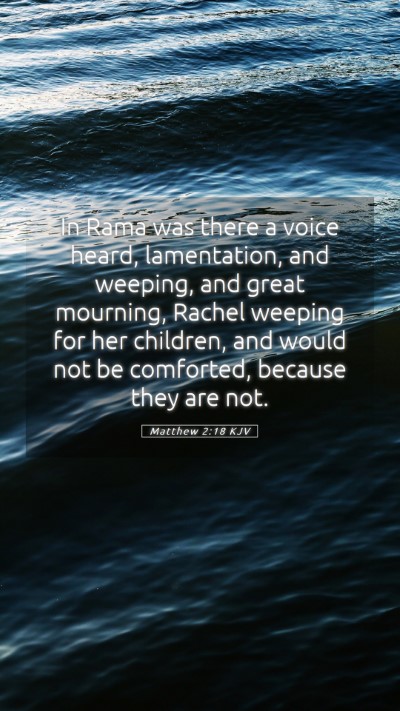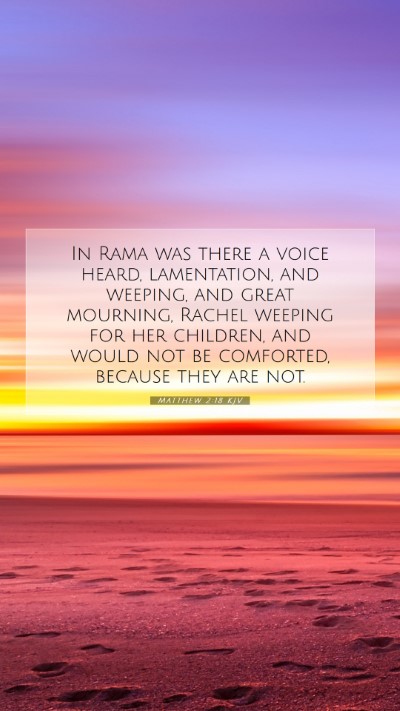In-Depth Commentary on Matthew 2:18
Bible Verse: Matthew 2:18 - "A voice was heard in Ramah, weeping and great mourning, Rachel weeping for her children; and she would not be comforted, because they are no more."
This verse is a poignant reflection on the sorrow surrounding the massacre of the innocents, as recorded in the Gospel of Matthew. Matthew 2:18 is deeply rooted in Old Testament prophecy and captures the anguish of loss within the context of God’s plan of redemption. To gain a deeper understanding, let’s draw insights from public domain commentaries.
Understanding the Verse: Commentary Insights
Matthew Henry’s Commentary
Matthew Henry emphasizes the fulfillment of prophecy in this verse. He notes that the reference to Rachel weeping represents the collective sorrow of Israel over the loss of their children. Rachel, the matriarch, symbolizes the heartache of the nation, recalling the fierce grip of grief upon God’s chosen people following Herod’s decree. This lamentation is not just historical but reflects the ongoing theme of suffering in God's redemptive plan.
Albert Barnes’ Commentary
Albert Barnes provides a historical context, explaining that Ramah was a site of significant sorrow. He suggests that the lamenting voice symbolizes the deep pain of loss associated with the exiled Jewish people. Barnes points out the emotional weight of Rachel’s weeping, indicating that it was not only physical children being lost but also the spiritual lineage that was under threat. This commentary sheds light on the broader implications of divine justice and providence in times of distress.
Adam Clarke’s Commentary
Adam Clarke elaborates on the symbolism inherent in this verse. He connects the maternal imagery of Rachel to the historical consequences of Herod’s actions, presenting Rachel as a representation of Israel’s grieving heart. Clarke notes that this verse can be viewed allegorically, suggesting that it reflects the continuing suffering of God’s people throughout the ages. The inability to be comforted speaks to the magnitude of grief that echoes through time, marking crises within the narrative of salvation history.
Key Themes and Applications
The core themes reflected in Matthew 2:18 include:
- The Grief of Loss: The verse captures the universal experience of mourning and the depth of parental love. Rachel’s tears embody the sorrow felt by those who have lost loved ones.
- The Fulfillment of Prophecy: This verse fulfills the prophetic voice seen in Jeremiah 31:15, illustrating how Jesus’ birth and its surrounding events were foretold.
- Divine Oversight: Despite the profound sorrow, the narrative holds a thread of hope, indicating that God is aware of His people's suffering and has a divine purpose, even in anguish.
Bible Study Insights
For anyone engaged in Bible study groups or seeking online scripture analysis, Matthew 2:18 serves as a powerful springboard for discussions about the nature of grief and divine prophecy. Here are a few insights for deeper engagement:
- Consider the historical implications of Herod’s massacre of the innocents and how it relates to themes of God’s protection over His children.
- Explore the concept of maternal figures in the Bible, drawing parallels with other instances of mourning, such as Naomi in the Book of Ruth.
- Reflect on personal experiences of loss and how this verse can provide comfort through shared grief and remembrance.
Cross References
This verse is related to the following scriptures:
- Jeremiah 31:15: A direct prophecy indicating Rachel's mourning for her children.
- Matthew 2:16: The account of Herod’s decree to kill the infants in Bethlehem.
- 1 Samuel 10:2: Relating to the mourning of the nation of Israel.
- Luke 2:34-35: Simeon’s prophecy concerning the coming savior and the pain He would bring to many.
Conclusion
Matthew 2:18 presents a profound Bible verse explanation that connects deep sorrow with prophetic fulfillment. Understanding this verse enriches our Bible study insights and gives perspective on grief—as part of a divine narrative that ultimately aims toward hope and restoration. Engaging with such scripture through Bible study tools can offer healing and encourage fruitful discussion in Bible study lessons.


